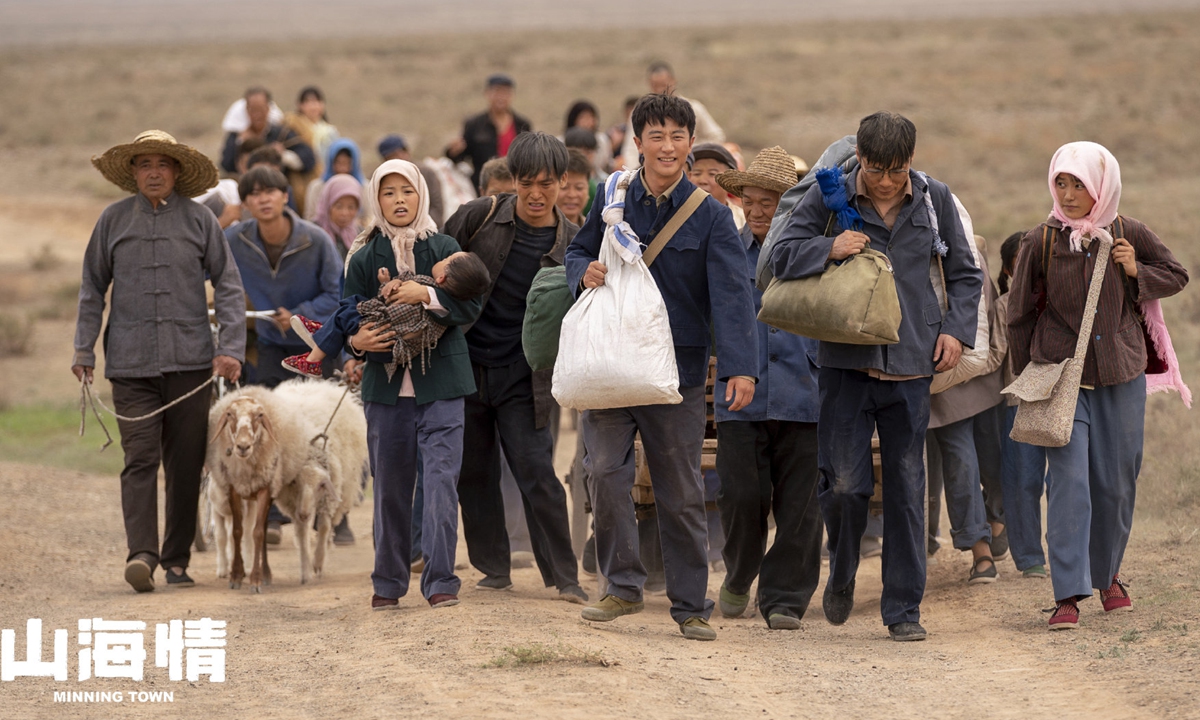A TV series focusing on a rural village smack dab in the Gobi Desert has introduced Chinese viewers to the valiant efforts made on the frontlines of China's fight against poverty.
Hundreds of millions of Chinese have been touched by the stories portrayed in the series. They have smiled and cried as they follow the characters in the series, such as three brothers who are so poor that they must share one pair of pants. Through these stories the audiences have seen the bitterness of poverty, but they have also been given hope by learning about the various government programs that have been implemented to lift these people out of poverty, such as helping farmers relocate from difficult-to-reach mountainous areas to the plains where they can take part in projects that allow them to develop garden economies.
Through this show, Chinese audiences have learned more about China's poverty alleviation efforts, but what about people overseas? Through reports from foreign media outlets such as CNN and Reuters, it is clear that many misunderstandings still exist concerning these efforts, alongside accusations that they are poorly planned, too rigid and not sustainable.
Here we welcome readers to set aside prejudices and follow the Global Times with a open mind to take a look at the real struggles of poor villages and villagers in China as they strive for better lives.
Now, their stories begin.
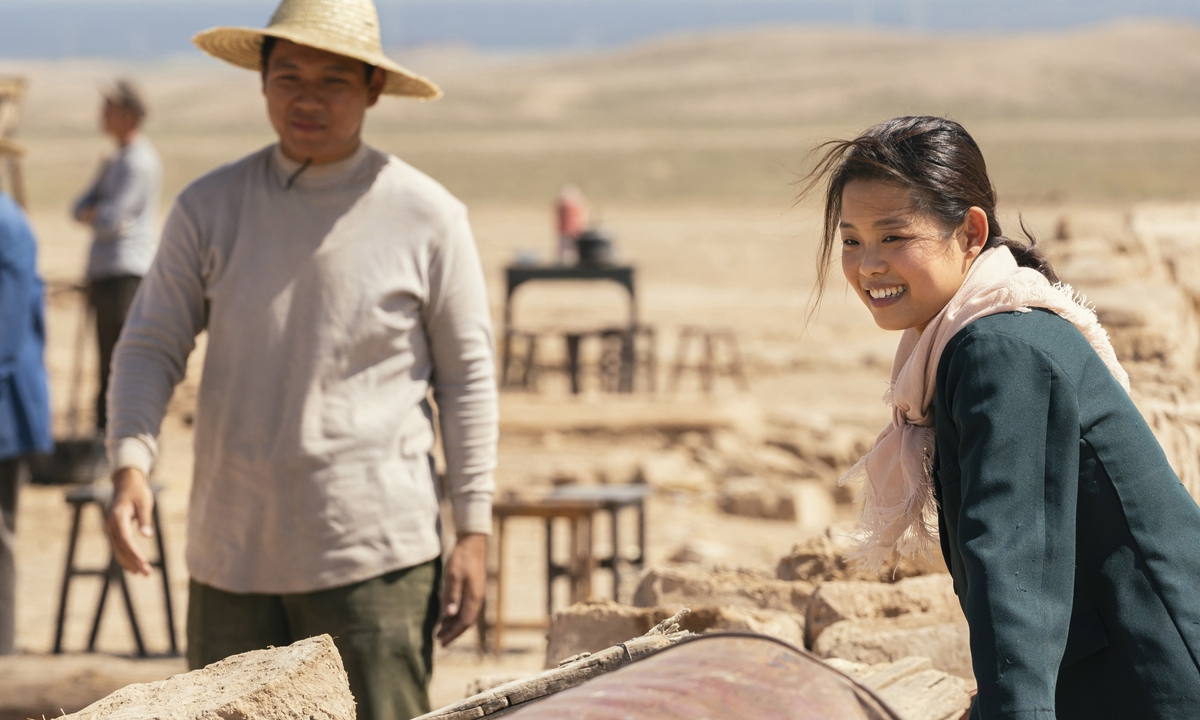
As gusts of wind kick up blinding swathes of sand that leave people barely able to open their eyes or breathe, several migrants from a poverty-stricken region in Northwest China pull carts carrying the oldest and youngest members of their families as they travel to their new home - a small piece of land in the Gobi Desert called Minning Town. Most of them probably do not have the smallest inkling that 20 years later, under the guidance of China's national poverty alleviation policy and the leadership of their local village official Ma Defu, this barren plain would be transformed into a well-organized township full of lively markets.
This is a scene from the new hit TV series Minning Town, which has touched viewers both young and old with stories based on the true experiences of villagers and local government officials working to bring life to a barren patch of desert in Northwest China's Ningxia Hui Autonomous Region during the 1990s.
Part of the first batch of TV dramas celebrating 2021's 100th anniversary of the founding of the Communist Party of China (CPC), Minning Town has won high viewership ratings during national prime time, earned a high score of 9.4/10 on China's biggest media review platform Douban and ignited discussions on Chinese social media about the hard-working spirit of the Chinese people and their pursuit for a better life.
The hashtag for Minning Town has earned 1.19 billion views on Sina Weibo. Many netizens have commented on the show's realistic depiction of the era.
"I can smell the sand and taste the bitterness through the screen," one Chinese commented on Sina Weibo in a post that has gained a lot of likes.
However, the real situation was even worse, according to those who had experienced it first hand, such as Xie Xingchang, the real life basis for the role of Ma Defu.
"The living conditions of the villagers were really difficult... They lived in big holes underground without water or electricity. They had to work on their own to change their living conditions, and many officials like Ma Defu participated in the poverty alleviation movement," Huang Xuan, the actor who plays Ma in the show, told the Global Times.
"Minning Town reflects the Chinese people's kind, hardworking, adaptable and persevering spiritual characteristics. These characteristics not only echo the national character flowing in our blood and imprinted on our genes, but also resonate with the spirit of the times today embodied by the Chinese nation during the coronavirus pandemic," said Shi Wenxue, a cultural critic and a teacher at Beijing Film Academy.
However, some young netizens commented on Sina Weibo that they found it hard to believe that China was once so poor, and wondered whether the show was exaggerating the real situation.
"This question comes from the young netizens' ignorance about China's past conditions. Such remarks show now necessary it is to film such TV series to remind them that no matter where you go, you cannot forget where you came from," Shi replied.
Note: He Kaijun has written 19 journal diaries since 2018 to record the various living conditions of more than 200 poor families and find ways to help them.
He Kaijun, a China Telecom employee-turned-poverty-alleviation-worker has written 19 journals since 2018, using more than half a million of words to record his experiences working as the first secretary of Yudi village in Southwest China's Chongqing Municipality.
His journals are filled with painstaking details about the various conditions and difficulties of the more than 200 poor families living in this area. These memos have guided him to help these families by providing them with the things they urgently need.
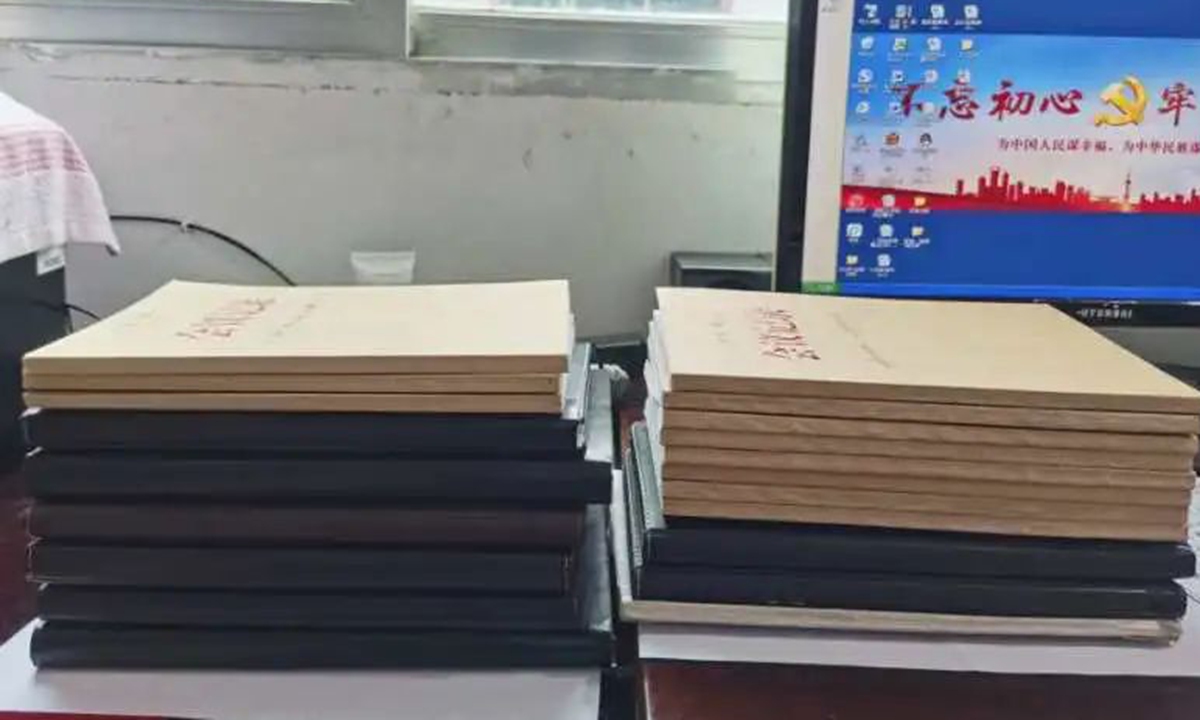
China's poverty-alleviation workers are committed to eating, living and working at designated poor stations. Taking He's case as an example, each worker in the village only looks after five extremely poor families at a time, but are responsible for dealing with any emergencies that happen in the entire area.
He told the Global Times that Chinese poverty alleviation workers are "athletes and referees at the same time," meaning they are racing to improve the lives of the poor while intervening in difficult situations such as conflicts between villagers or helping them to deal with physical or environmental accidents.
Note: A poor village’s long-term development requires a pair of keen eyes to identify its “specialty,” and to turn such specialties into sustainable market-oriented projects
Despite the fact that poor areas often face difficulties such as underdeveloped infrastructure and a lack of educational resources, they still possess huge potential for long-term development relying on agriculture.
In 2020, Chetian village in Youyang county was one of the last four villages in Chongqing to be lifted out of poverty.
The village barely scraped by through a reliance on plants that produce edible camellia oil. However, under the helm of the village's first secretary Peng Mingyong, during the second half of 2018, the village began to work with a construction company to expand what the secretary called "the thing we are proud of and good at" by growing camellia oil trees on a large scale.
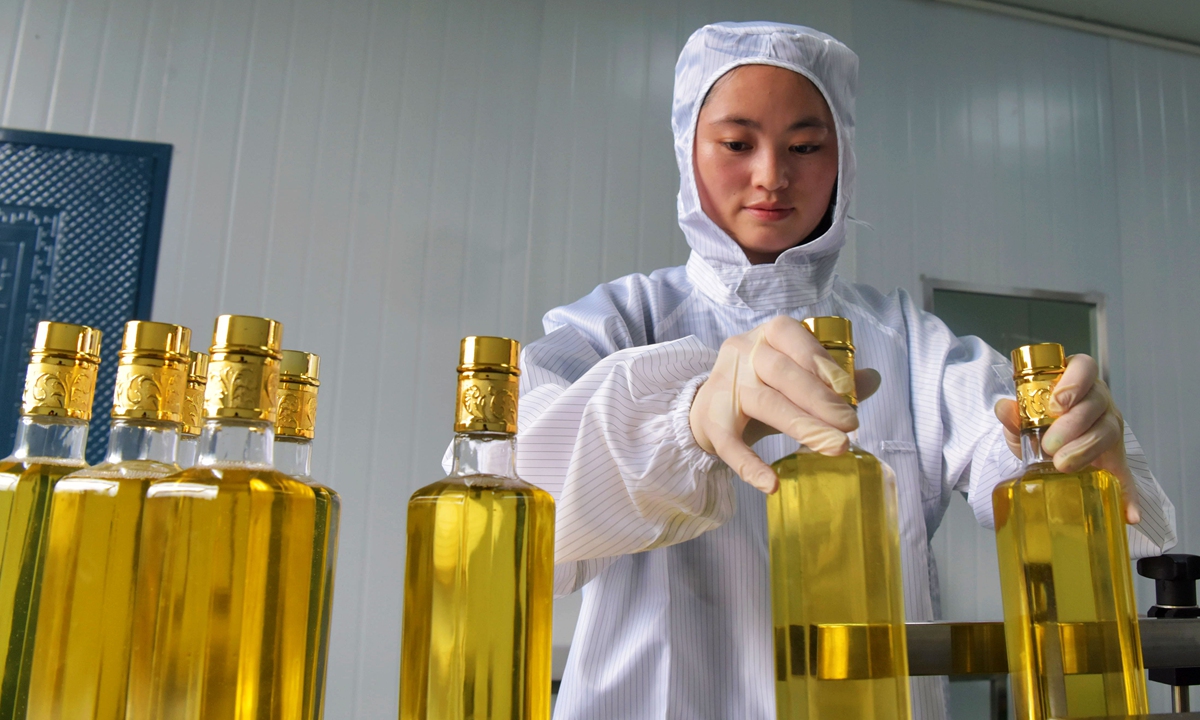
The new camellia oil tree farm was created by combining the villages, individual spare farmland together. In exchange for voluntarily providing these lands, the villagers receive subsidies for the land, a guaranteed job at the local factory and a portion of all revenue earned through the sale of the oil. The construction company also provides technical guidance, planting training sessions for workers and financial support for the project.
"Our next move is to expand the village's camellia oil processing factory, and we've already produced oil products for our e-commerce platform," Peng told the Global Times.
In the opinion of 29-year-old Ren Min, a first secretary in Sichuan Province, finding ways to sell local specialties has been key to helping her people walk out of poverty. She always carries a backpack full of work notes and local specialties to introduce to those she meets, winning her the name of Backpack Secretary.
Note: Creative-minded Chinese entrepreneurs are seeking out new "crossovers" to fuel the future development of China's poverty alleviation efforts.
Combining poverty alleviation with other industries is one of the latest experiments being carried out as part of China's efforts to help people shake off poverty. Socially and culturally minded entrepreneurs are using their creative expertise to help with these efforts. What was once a seemingly rigorous political-oriented scheme has started taking on increasing variations such as turning to the arts to alleviate poverty as well as establishing prominent new fields such as poverty alleviation-orientated cultural tourism.
"816 Town" is an ingenious cultural tourist project launched by architect Li Chuanbo and his team in a Southwest China's village neighboring a former base for an underground nuclear project dating back to 1967.
To reach the goal of the project - "revitalizing the rural area" - Li created a new tourist spot that includes the once underdeveloped village and the areas near the base.
"816 Town" now functions as an educational base, art exhibition hall and shopping center for cultural products.
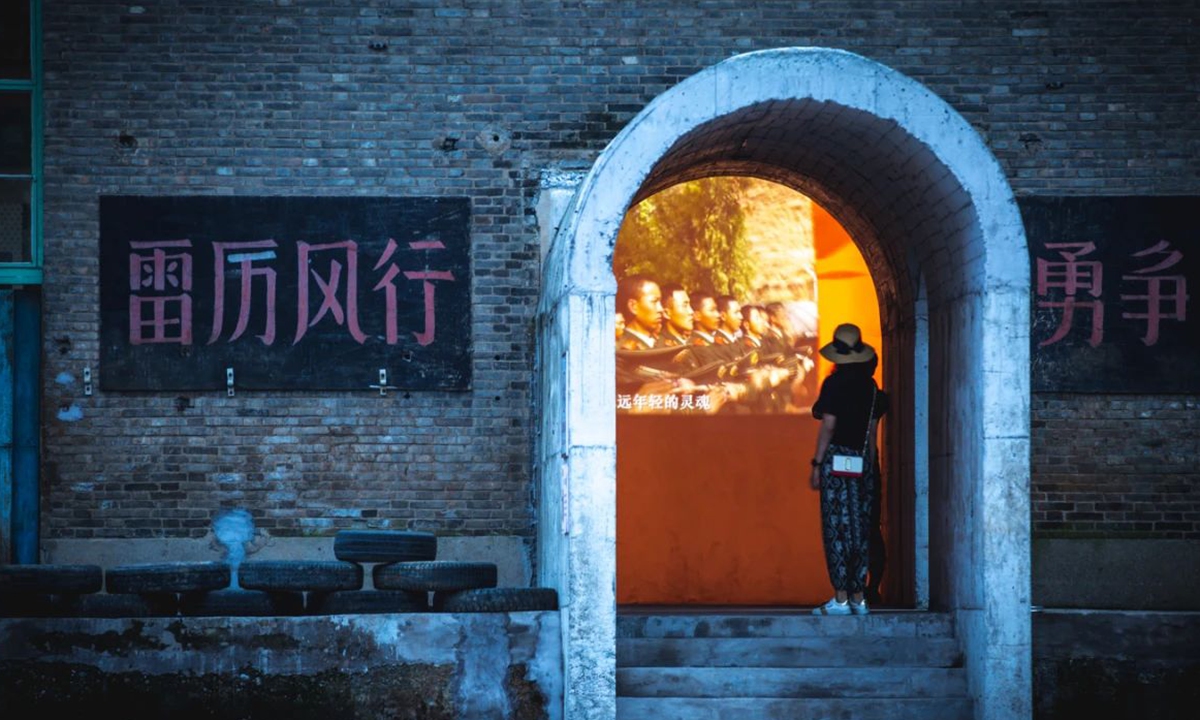
It aims to attract tourists whose spending will consequently help the villagers working at the tourist sites, work with residents to transform local products into more appealing cultural derivative products.
There have also been voices of support from overseas. Japanese director Atsuo Fujita, who went to several rural areas to film a documentary about reducing poverty in China, told the Global Times what he saw and heard during the shoot.
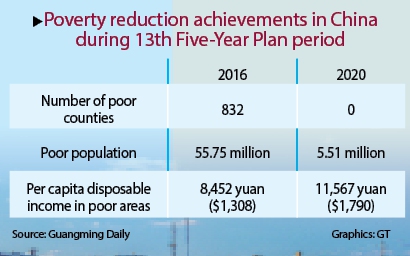
He noticed that high-speed transportation networks such as highways and bullet trains have been built and wi-fi is available even in mountainous locations.
"As I traveled along the highway without a single car passing by in the wilderness as far as the eyes could see, I was struck by a strange feeling. 'How far will they have to go?' and 'How far will they go?'"
He heard a story about a farmer who lived upon a steep slope. In order to make it more convenient to travel to and from his home for work, the government paved a road up the slope, which made the director wonder what kind of government constructs roads for private houses?
